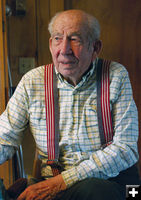Libby man recalls battle for Okinawa
by Brent Shrum, Kootenai Valley Record
April 10, 2010
From the "hungry thirties" to the battle for Okinawa to a career working in the woods of the Northwest, Libby’s Frank Barnard has seen a lot over the past nine decades.
Barnard, who recently celebrated his 90th birthday, grew up on a farm at Sarpy Creek in southeast Montana. He remembers his teen years as the "hungry thirties," a time when the economic bust of the Great Depression and an extended drought made it hard to just get by.
"The only time we got moisture was when it froze solid in the winter time," Barnard recalled.
Barnard remembers how hard it was on his mother to have to water down the potato soup she fed her five children, and the time his father had to ignore her pleas to slaughter a steer they had raised because he needed to sell it to pay the taxes on their farm. Barnard’s dad was a Republican, and he refused to accept assistance from the government, preferring to go it alone.
At the age of 16, Barnard went to Wyoming to find work. He got a job at a ranch at Sheridan, and he remained there for several years until joining the Navy during World War II.
After boot camp in Portland, Ore., Barnard joined the "Seabees," the Navy’s Construction Battalions. A 30-day voyage across the Pacific landed him at the island of Bougainville, which had just been wrested from the Japanese.
When Barnard’s ship arrived offshore of Bougainville, a call went out for drivers to take trucks from a barge onto the island, and Barnard raised his hand. It turned out to be an early lesson in not volunteering for anything while in the military.
Once on the island, Barnard found "the biggest Quonset hut I ever saw, all mail bags in it." His job for the day turned out to be loading all those bags onto the trucks so they could be taken back to the ship.
There was a silver lining, however. Barnard also found some trees full of coconuts, and he hired a native to climb up and bring some coconuts down.
"I got about 20 coconuts, I think, and took them back to the ship and sold them for a dollar apiece," he said. "Everybody wanted one."
Barnard spent about a year at Bougainville, building roads and airfields, before taking part in the invasion of Okinawa in the spring of 1945. The massive operation began with a ruse, with troops faking a landing on the east side of the island at dusk, Barnard recalled.
"It got dark, so everybody reversed and went around the island and came up on the west side," he said.
The Marines landed around 4 a.m., and they went straight across the island to cut it in two and split Japanese forces.
"Some went north, and some went south," he said.
The Japanese were deeply dug into "honeycombed" ridges, and they would wheel out howitzers on tracks to fire at the Americans, Barnard said. The Marines had 105mm howitzers of their own, and one of Barnard’s jobs was to keep them firing.
"We were with the Marines," he said. "We were ammunition packers for the Marines for a while."
Barnard had a close-up view of the intense fighting for the ridges.
"You got behind them when they’d shoot that 105, and you looked and you could see that shell go all the way," he said.
Barnard also saw Marines coming back from the battle on stretchers. He remembers a mile-long convoy of jeeps and trucks loaded with stretchers carrying wounded Marines.
He talked to one of the Marines, who told him he’d been serving for four years. The Marine had a shoulder wound, a broken arm and a broken leg.
"He said, ‘I wonder if they’re going to let me go home now," he said.
Barnard also remembers watching a Japanese plane flying at dusk at extremely low altitude down a river channel to the ocean and out toward the ships that were supporting the invasion.
"Nobody could shoot at it because it was lower than the ship was," he said.
Finally, a British battleship that had been shelling Japanese positions on the island was able to bring its guns to bear on the plane.
"The first shell was about a half-mile behind him, and the second shell was about a quarter mile, and the third one, it was just a big ball of fire," Barnard said. "That’s when they got him."
Barnard returned to the Montana after the war and moved to Libby in the 1950s. He went to work at the J. Neils Lumber Co. mill in 1955. One of his co-workers was Frank Peck, who, as it turned out, had also been at Bougainville and had been only about a mile away from Barnard, although they hadn’t known one another at the time.
After a few years with J. Neils, Barnard went to work for the Forest Service, starting out piling brush and moving on to surveying and administering sales in northwest Montana and in Idaho. He retired in 1983.
_________________________________
Editor’s Note: See the April 6, 2010 edition of the Kootenai Valley Record for the printed version of this story. The Kootenai Valley Record publishes once a week, on Tuesdays, in Libby, Montana. They are a locally owned community newspaper, located at 403 Mineral Avenue in Libby. For in-county and out-of-county subscription information, call 406-293-2424, or e-mail kvrecord@gmail.com.
|

